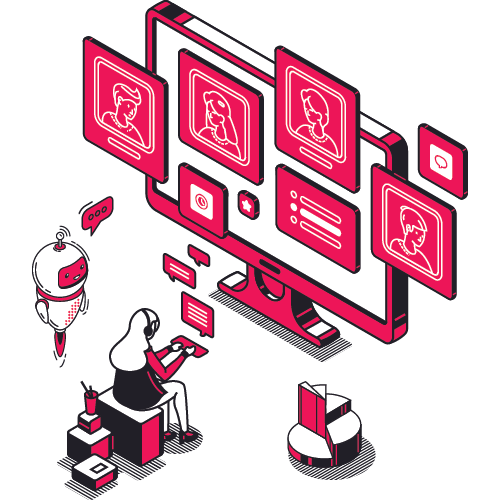How AI is transforming the CCaaS business model.
Few technological innovations will have the disruptive impact that artificial intelligence (AI) is set to unleash across every business sector.
By Martin Cross, Chief Strategy Officer at Connect.
While AI will help create new products, solutions and services, the biggest disruption will likely come from the new business models this technology enables.
Just like Software as a Service (SaaS) disrupted the enterprise application market, AI will create new business models that will challenge the status quo in various industries.
In this regard, Microsoft CEO Satya Nadella predicted that an AI-driven Agents-as-a-Service (AaaS) model will replace SaaS.

Contact centre disruption.
The contact centre sector is a prime target for this AI-led disruption. Numerous operators are still implementing their digitalisation and modernisation strategies by embracing a Contact Centre as a Service (CCaaS) model to access advanced capabilities and integration in the cloud.
However, the pace at which AI is transforming technological capabilities will have implications for contact centre operators, system integrators and vendors. While this shift is an opportunity to redefine customer experience strategies, it necessitates careful consideration when rolling out contact centre modernisation strategies.
Changing enterprise app role.
A major consideration in any cloud transformation is the role of enterprise applications, as AI will transform the role of systems of action – software solutions that facilitate and support the complex, interconnected activities that make up a business’s operations.
For example, AI will fundamentally change the role of a Customer Relationship Management (CRM) system within the contact centre. With the ability to listen to a call, suggest how to deal with it, and send a summary of what happened on the fly, AI solutions will handle more of the customer relation tasks that commonly require a CRM system.
These well-defined and common processes also make them easier to automate in the contact centre using AI, which will reduce reliance on CRM solutions.
As an example, buy-now-pay-later fintech provider Klarna shed its reliance on SaaS providers, replacing them with AI solutions developed in-house. The company claims that its AI-powered customer service assistant, launched in collaboration with OpenAI, has already performed the work of 700 human agents and handled millions of interactions.
However, structured data will still hold relevance when training AI engines for accuracy, access control, and latency, despite long large language model (LLM) context windows.
Operators will still require deterministic workflows for repeatability and control, which is where systems of record and workflow management solutions will continue adding value, particularly for agentic AI tools.
Shifting revenue models.
Another major implication is a change from traditional revenue models to consumption-based or usage-based models. This shift will exert upward and downward pressure on software business models by eroding subscription-based licencing fees to consumption-based or usage-based models.
This new chapter in revenue generation will take the form of a services-led proposition that delivers measurable business outcomes through the successful analysis of data to successfully implement and continually optimise AI.
These services could include AI-enabling solutions related to liberating organisational data, such as legacy voice recordings, emails and chats for AI training data, speech recognition and intent recognition tuning, automation insights and data-driven decision-making, wrapped in outcomes-based recurring services like AI optimisation.
Decentralised contact centres.
AI will likely turn the traditional centralised contact centre model on its head. The conventional contact centre concept emerged as companies brought teams of people together into a single building to communicate with customers or suppliers.
They also merged infrastructure to manage the operation better, create efficiencies and achieve scale. As technology advanced, capabilities improved and evolved, creating opportunities to route and manage higher contact volumes. The dawn of the internet then enabled solution providers to shift call centres from legacy on-premise mini-channel platforms to multi-channel and then omnichannel CCaaS platforms.
Now, knowledge-enabled and integrated into business data, AI can understand customer intent and answer questions, quickly and accurately. Moreover, AI can start to automatically route calls to the person in the organisation best suited at address the issue or query, regardless of where they are, negating the need to house a centralised workforce in the call centre.
This capability will allow companies to distribute their human resources back into the business, working within their specific departments to provide a better level of service and add greater business value with specific skills.
Future of CCaaS.
However, the potential end of the SaaS model as we know it does not signal the demise of cloud-based software in the contact centre.
Instead, it signifies a new era where enterprise software solutions transcend their role as a standalone product, evolving into a transformative tool capable of reshaping operations when implemented as part of a broader services-led approach that embraces AI.
About‘Connect.
Connect combines global contact centre and customer experience (CX) expertise, deep domain knowledge, and unparalleled industry skills to make the complex, simple. Since 1990, we have leveraged our vendor-independent managed services approach to digitally transform how organisations communicate, both internally and externally. We specialise in combining the most relevant technologies and services from leading vendors and platform providers to create opti-channel engagement solutions, orchestrating frictionless experiences and simplifying complex communication challenges.
Connect with us Connect UK, Connect South Africa, Connect India, Connect USA.
Find out how we can help your business communicate better.
To discuss your communications challenges and requirements, get in touch with us today.
Connect with us now.
New web: Contact Us
"*" indicates required fields